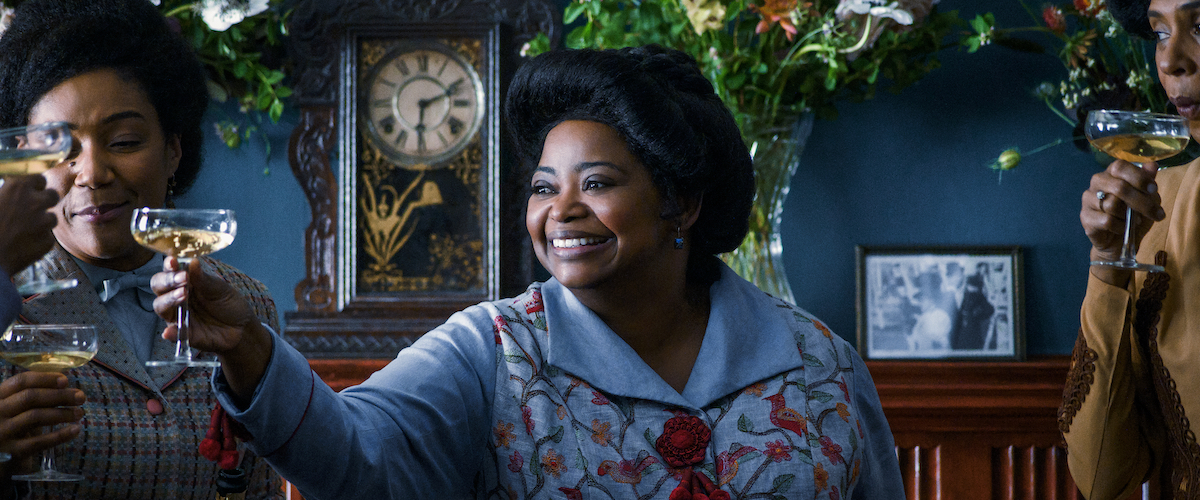This review was originally published on March 20, 2020 and is being republished for Black Writers Week.
“Sisters, sisters! Let’s talk about hair. Hair can be freedom or bondage. The choice is yours.” – Octavia Spencer as Madam C.J. Walker
Black women’s hair has been knotted and snarled by issues of race, politics, history, and pride for centuries. Hair is not just our crowning glory, but a sort of declaration of our spirit. For Black women, hair can bring forth feelings of both sweet nostalgia and shame. Netflix’s “Self Made: Inspired by the Life of Madam C.J. Walker” explores the life of the woman who made it her life’s mission to appreciate and care for the array of beauty portrayed by Black women and their hair.
The four-part limited series brings the story of Black hair culturalist and businesswoman, Madam CJ Walker, to the screen for the first time. The first to be born free of her six siblings, Walker, born Sarah Breedlove, withstood the blows of familial betrayal and rancor competition to revolutionize Black haircare. Walker’s story is one of devotion, shifty ingenuity and absolute mettle against the backdrop of post-slavery racial and gender oppression.
Inspired by the writing of her great-great-granddaughter, A’Lelia Bundles (On Her Own Ground: The Life and Times of Madam C.J. Walker), the series stars a powerfully radiant performance from Academy Award-winner Octavia Spencer that should definitely place her in the upcoming Emmy race. Spencer’s portrayal of Madam C.J. Walker exudes equal parts strength and vulnerability as she effortlessly retains the on-screen presence to draw viewers in from the first episode. Rarely seen in the eminence as the lead performer, Spencer boasts a keen spirit that convincingly embodies the well-known Black philanthropist and entrepreneurs’ grandiose vision (“Big as Carnegie, Ford, and Rockefeller put together.”) at the turn of the 20th century.
With breathtaking period costumes and sets, including an impeccably familiar variety of hats on both women and men, “Self Made” is unapologetic in its examination of the many facets of Black life in the late 1800s. The longstanding cultural skirmishes of colorism loom large over Madam C.J. Walker’s story. Carmen Ejogo’s performance as hero-turned-adversary Addie Munroe reminds us that hair is not benign for Black women but potent and often serves as a measure of a woman’s worth. Yet, the series does a worthy job of exploring the expansive nature of Blackness at that time, escaping the tired trope of the fearless white savior demanded by a praying white gaze. To see a film uplifting racial progress absent the authority of white idealist is overdue.
One of the quiet joys of watching biographical stories is parsing through what is fact, what is fiction, and what falls in-between. For example, Walker’s daughter Lelia (Tiffany Haddish). Rarely acknowledged, Lelia is often considered the reckless daughter who diminished the Walker beauty empire and never matched her mother’s civic-minded pursuits. However, she was a pioneer in her own right, undeserving of the dismissive “party girl” moniker often bestowed upon her memory.
The series offers a titillating will she/won’t she mystery of unspoken and unrequited queer romance. Haddish is quirky as Lelia (later known as A’Lelia), but the energy and charisma that has skyrocketed her career is on full display, creating one of the more intriguing peripheral stories. Lelia would be dubbed “The Joy Goddess of Harlem’s 1920s” by famed poet Langston Hughes because of the crucial role she played in creating a safe space for queer artists during the Harlem Renaissance. While history may not remember Lelia’s business acumen kindly, it would simply be a disservice to fail to acknowledge the important creative, sexual, and emotional connections built at the Walker residence, Villa Lewaro, and Lelia’s Manhattan salon, The Dark Tower. These relationships likely forged and shaped the arts and letters culture of one of the most pivotal periods in American history.
“Self Made” is ready for binge-watching with just over a three-hour total run time. The pace is perfect, dipping into the interior lives of its main characters while grounding the story in the necessary historical relevance of the times. However, the series wastes some precious real estate in a number of fantastical, dream-like sequences intercutting the main story that often feel forced and heavy-handed, especially in episode one “The Fight of the Century.” But even with those minor missteps, the series is a smart, genuine portrayal of a venerable figure. “Self Made” is equal parts an entertaining account of the first woman millionaire, and a sharp critique of the margins along which Black people endure in a long history of systemic racism and gender-based oppression.



















